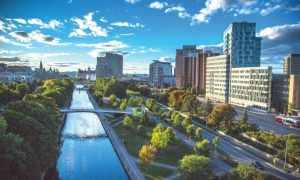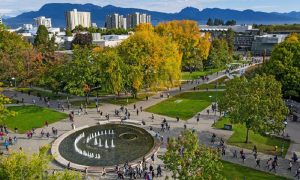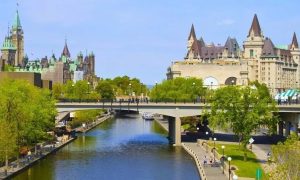Immigration to CanadaThe interview is an important step in obtaining a visa and permanent residency. During the interview, theimmigrantsThe officer will use a series of questions to assess the applicant's background, motivation, and ability to adapt to Canada. This article will addressImmigration to CanadaCommon questions in the interview are analyzed and some answering techniques are provided to help applicants present themselves better and pass the interview successfully.
One,Immigration to CanadaInterview Frequently Asked Questions
1. "Why ChooseImmigration to Canada?"
Intent of the question: Immigration officers want to know about youImmigration to Canadamotivations, perceptions of Canada, and whether there are good reasons for choosing Canada.
Answering skills: Answers can incorporate Canada's strengths, such as its education system, health benefits and social security, as well as your personal motivation for immigrating. You can mention that you want to provide a better education or living environment for your family, or that you think Canada's multiculturalism is better suited to your development. Avoid being too general or vague. It is better to show a detailed understanding of Canada.
sample answer (e.g. questionnaire or commentary): "I chose to immigrate to Canada because of the excellent education and healthcare systems and because Canada is very multicultural and inclusive. I want my family to grow up in a safe, inclusive environment and receive a good education. At the same time, Canada has friendly policies towards immigrants and I think I can contribute to the society here."
2. "What do you know about the Canadian living environment?"
Intent of the question: This question examines whether the applicant has some general knowledge and basic understanding of life in Canada.
Answering skills: Answers can be based on climate, lifestyle, transportation, and healthcare system. In particular, it is important to know the basics of the province and city where you will be living, such as the need for adequate warmth in areas with colder winters.
sample answer (e.g. questionnaire or commentary): "I understand that the climate varies greatly from region to region in Canada, for example, Toronto has four distinct seasons while Vancouver is relatively mild. As I am planning to live in Toronto, I understand that it can be very cold in winter and I have prepared warm clothes accordingly. In addition, Canada's transportation system and healthcare system are also very good, especially the universal healthcare coverage, which makes me feel more at ease about my future life."
3. "Do you have a career plan? How do you adapt to the Canadian workplace culture?"
Intent of the question: Immigration officers want to know about your readiness for Canadian job opportunities and your ability to adapt to Canadian workplace culture.
Answering skills: Answer by specifying what you do for a living and sharing what you know about the industry in Canada. At the same time, show that you are open to Canadian workplace culture, such as teamwork and a sense of time, and demonstrate your willingness to integrate.
sample answer (e.g. questionnaire or commentary): "I work in the IT industry and am aware of the booming tech sector in Canada. I plan to continue developing my professional skills in Canada, especially in artificial intelligence and data analytics. In addition, the Canadian workplace culture promotes teamwork and respect for time, which I will try to adapt to and expand my network by attending professional social events."

4. "How do you cope with the cost of living in Canada?"
Intent of the question: Immigration officers want to make sure that the applicant is adequately prepared for the cost of living in Canada to avoid financial hardship.
Answering skills: You can mention what you know about the cost of living in the area, including the cost of housing, food, transportation, and medical care, and specify how you plan your finances to meet these expenses.
sample answer (e.g. questionnaire or commentary): "I have learned that the cost of living in Canada, especially in big cities such as Toronto and Vancouver, is relatively high in terms of rent and daily expenses. I have prepared a certain amount of savings for life and made a detailed budget plan. At the same time, I plan to look for a suitable job once I have stabilized to ensure financial independence and a stable life."
5. "Do you have any family or friends in Canada? If so, what is your relationship with them?"
Intent of the question: Knowing whether an applicant has a social network to support them can help determine their ability to adapt.
Answering skills: If you have friends or relatives in Canada, you can briefly describe how they live and how they support you. If not, you can show that you are willing to make new relationships in Canada.

sample answer (e.g. questionnaire or commentary): "I have a cousin settled in Toronto who has been living in Canada for 5 years and has given me a lot of advice about life and work. I plan to establish my social circle as soon as possible after arriving in Canada, as well as actively participate in community activities and integrate into the local society."
II. General techniques for answering questions
1. Stay calm and confident
Immigration officers prefer applicants who are calm and collected. Keep a smile on your face and speak at a moderate pace during the interview to give a positive and confident impression.
2. Keep it simple and avoid redundancy
Be concise and to the point, don't beat around the bush. Immigration officers interview several applicants a day, so it's easier for them to understand your intentions if you keep your answers simple and to the point.
3. Provide specific examples
Providing examples can make the answer more realistic and believable. For example, you can support your answer with actual work experience or a specific family situation to add conviction.
4. Respect and courtesy
It is basic etiquette to remain polite during an interview. Regardless of whether the person's questions are unexpected or challenging, always be polite and demonstrate respect for the interviewer by answering questions in as much detail as possible.
III. Common Misconceptions to Avoid
1. Avoid exaggeration and false information
Avoid exaggerated or untrue information during the interview. Immigration officers have a lot of experience and can easily recognize exaggerated or untrue answers, which can even affect the final outcome of the interview.
2. Not sure of your application category and policy
When answering questions, applicants must be very familiar with the immigration category they are applying for and the relevant policies. Otherwise, they may get into trouble when asked relevant questions. Know the specific conditions and process of your application in advance to ensure professional answers.
3. Over-reliance on family and friends for support
If you mention that you have family or friends in Canada, you also need to demonstrate that you are able to live independently, showing that you are financially and psychologically independent and not overly dependent on others.
IV. Tips after the interview
After the interview, it is appropriate to follow up by expressing appreciation to the INS and the immigration officer. While this will not directly affect the outcome, it demonstrates good manners and helps leave a positive impression.
summarize
The Canadian immigration interview is not only a supplementary verification of the application materials, but also a further understanding of the applicant's adaptability and motivation to immigrate. By mastering common questions, preparing adequate answers and demonstrating a confident attitude, you can effectively improve the pass rate of the interview. We hope that the guidelines in this article will help you stand out in the interview and start your new life as an immigrant in Canada!






